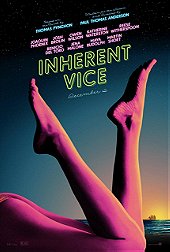You know, I never had anything less than absolute faith that Paul Thomas Anderson would manage to create a perfectly fine adaptation of Thomas Pynchon’s work, but what I couldn’t even begin to imagine was just so immaculately he would manage to transfer the swirling, labyrinthine nature of the author’s work to the screen. Typically narrative structure has never been a strong concern with Pynchon, and the more I think about the complete work of Anderson, the more that seems true for him as well. Here is a marriage between an original work and adaptor that captures the essence of the work while standing strong as its own piece.
There’s a plot to Inherent Vice, filled with strangely named characters, bizarre intersections of various sub-plots, and a central shadowy conspiracy uniting the entire thing. Yet what made Inherent Vice such an enjoyable and strange head trip for me was the sustained tone and vibe of the entire film. Vice manages to strike notes of melancholy and uproarious laughter, weaving them in and out as needed, while never breaking away from the hazy, druggy hang-out vibe.
Instead of trying to figure out the logistics and coherent narrative steps, one should come to this film knowing that this is not the primary concern. One should instead sit back, and just let the film’s oddball tendencies and dynamic actors charm and enchant you. Yes, there’s a story being told in the more conventional sense, but Vice feels like an elegy to a time that was, and one can see the main character’s former life eroding away piece by piece.
Praise be to the continued glorious weirdness of Joaquin Phoenix’s choices as an actor lately. I’m still miffed he lost out Best Actor for The Master, even if Daniel Day-Lewis was highly deserving, and my annoyance with his lack of a heavily loaded awards mantle continues with this film. There’s no way in hell he stood a chance of getting traction, the film and performance are too shaggy, idiosyncratic, divisive even, to truly call attention, but he deserves it. His central performance is the prism through which we put together this cockamamie story, and his permanently stoned brain only adds to the merry puzzlement of trying to accomplish that. Phoenix has a long history of obsessive, damaged, highly serious portraits in his filmography, and nothing really braced me for the comedic, giddy, light-hearted hippie private detective he essays here. If Anderson can get two such great performances out of him, I can only hope that he becomes a permanent fixture in Anderson’s stock company of actors.
Just as good as the litany of supporting roles, each offering a strange new color or texture to the film’s exceedingly strange nature. Josh Brolin was robbed of a supporting actor slot, and if not for J.K. Simmons’ great work in Whiplash, maybe even the win. Loads of actors appear in brief walk-on roles and are given a chance to go broad and grotesque as possible in their readings of these characters, Pynchon’s work is one that can easily handle a more obtuse rendering. Martin Short, Benicio Del Toro, Eric Roberts, Serena Scott Williams, Jena Malone, Maya Rudolph, Reese Witherspoon, Belladonna, Hong Chau, Katherine Waterston, and Joanna Newsom barely scratch the surface on the familiar faces of well-known and long-time character actors doing commendable work in this film.
It is well documented that I did not particularly care for Birdman, and while I love the work of Emmanuel Lubezki, I feel like it should have lost the cinematography Oscar to this. It’s a gloriously bleached out film, effortlessly capturing and reconstructing the look of the New Hollywood 70s. And it definitely should have won the Adapted Screenplay category. How it lost to middling and aggressively generic The Imitation Game is up for debate, although in typing that sentence I think I may have figured out why it lost and that piece of Oscar-bait clap-trap won out. The screenplay categories are a haven for more adventurous nomination choices, but that doesn’t consistently translate into actual wins. It becomes a case of the nomination being the victory.
Anderson mentioned that Robert Altman’s The Long Goodbye was a major influence on this, and with that film’s complicated plotting, contrast between sunny Los Angeles scenery and descent into the darkest of conspiracies, and man-out-of-time lead, a road map is provided for this one. It would be interesting to see both of these films back-to-back and see how they work synchronously, like watching a disciple trying to execute the teachings of his master, and how they differ, Altman and Anderson have a lot of similar tricks and obsessions but they’re very different artists.
 Login
Login